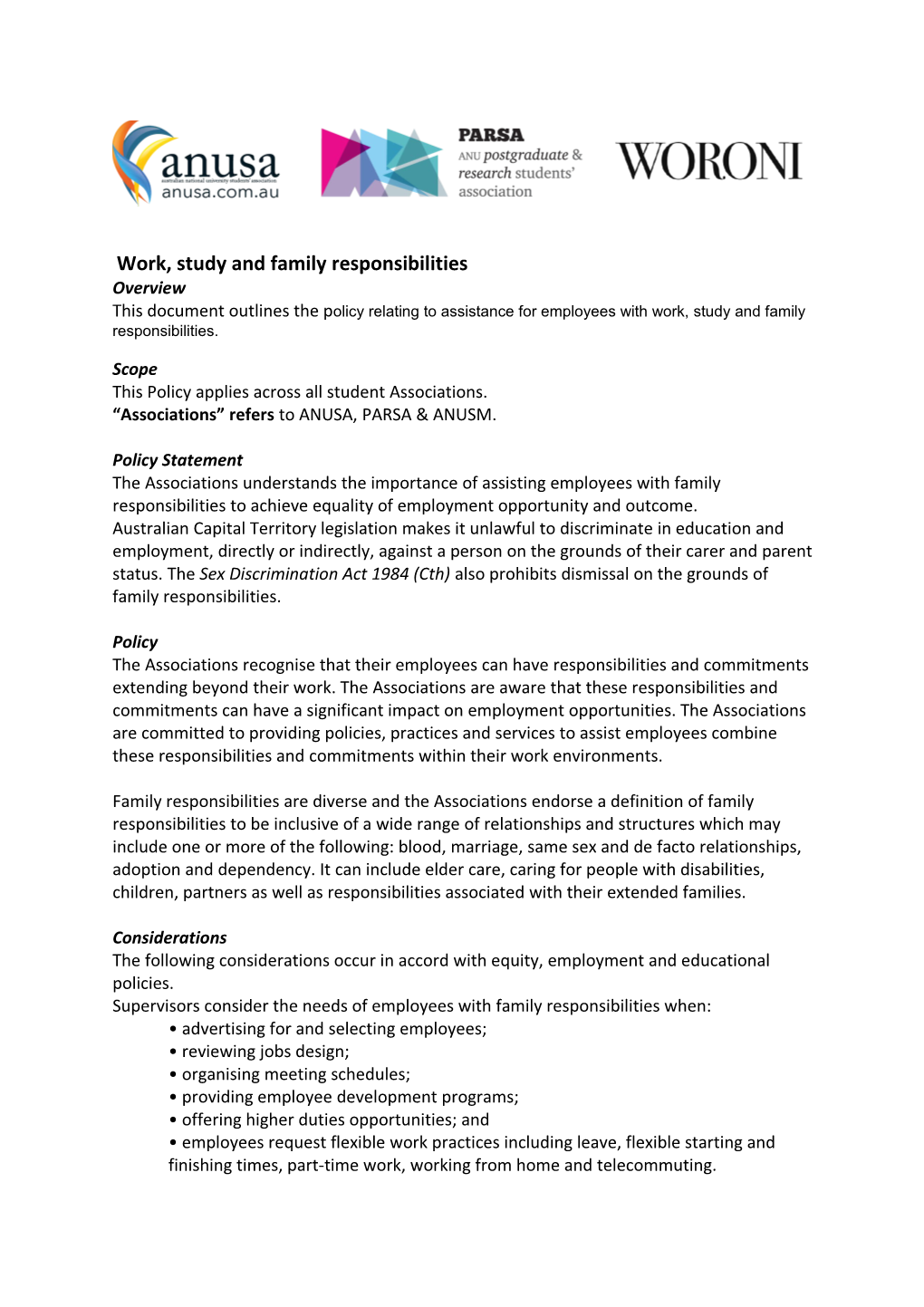Work, study and family responsibilities
Overview
This document outlines the policy relating to assistance for employees with work, study and family responsibilities.
Scope
This Policy applies across all student Associations.
“Associations” refers to ANUSA, PARSA & ANUSM.
Policy Statement
The Associations understands the importance of assisting employees with family responsibilities to achieve equality of employment opportunity and outcome.
Australian Capital Territory legislation makes it unlawful to discriminate in education and employment, directly or indirectly, against a person on the grounds of their carer and parent status. The Sex Discrimination Act 1984 (Cth) also prohibits dismissal on the grounds of family responsibilities.
Policy
The Associations recognise that their employees can have responsibilities and commitments extending beyond their work. The Associations are aware that these responsibilities and commitments can have a significant impact on employment opportunities. The Associations are committed to providing policies, practices and services to assist employees combine these responsibilities and commitments within their work environments.
Family responsibilities are diverse and the Associations endorse a definition of family responsibilities to be inclusive of a wide range of relationships and structures which may include one or more of the following: blood, marriage, same sex and de facto relationships, adoption and dependency. It can include elder care, caring for people with disabilities, children, partners as well as responsibilities associated with their extended families.
Considerations
The following considerations occur in accord with equity, employment and educational policies.
Supervisors consider the needs of employees with family responsibilities when:
• advertising for and selecting employees;
• reviewing jobs design;
• organising meeting schedules;
• providing employee development programs;
• offering higher duties opportunities; and
• employees request flexible work practices including leave, flexible starting and finishing times, part-time work, working from home and telecommuting.
Studies Assistance and Personal Development
Employees may be reimbursed reasonable expenses to undertake approved University or TAFE/CIT studies or other approved activities agreed as part of the CPD plan and granted paid leave to attend mandatory course related activities that are scheduled during business hours.
As part of the career and performance development process, employees and supervisors may identify activities to assist the employee achieve personal excellence, and where possible achieve career aspirations.
Employees and supervisors need to consider the wide range of development opportunities available to enhance their development. For example, formal award courses, conference attendance, on-line training, on-the-job training, workshops, online and library based reading material. However, access to development events, financial support and study leave must be balanced with the operational requirements of the area.
Where membership of a professional association is required for an employee to undertake a role the Association will pay the employee’s professional membership fees.
Breastfeeding
The Associations will support breastfeeding employees through promotion of the Associations’ policy and workplace provisions for breastfeeding, including providing information about where to access appropriate facilities.
Childcare
Following consultation with the President an employee may, when it is agreed appropriate and safe to do so, bring one or more children to work where this does not conflict with the performance of the employee or other employees. Requests by employee to bring their children to the workplace shall be treated sympathetically.
Employee Assistance Program
To assist the officers with the personal pressures associated with the pastoral care component of their role the Officers will have access to the Associations Employee Assistance Program (EAP).
The Employee Assistance Program (EAP) is a professional and confidential counselling service delivered by an external company, Davidson Trahaire Corpsych, and the EAP is available to all employees and their immediate family members.
The EAP can assist with dealing with a wide range of personal and work-related issues. Some examples are these below: PERSONALIssues / WORK-RELATED
Issues
Relationships & couples counselling / Work/life balance
Anxiety, stress & depression / Career
Bereavement, grief & loss / Change
Family, child & eldercare / Difficult customers
Suicide / Team performance
Communication / Redundancy / career transition
Violence & anger / Work crisis & trauma
Substance abuse & addictions / Performance
Legal & financial / Conflict
Managing life stages / Bullying & Harassment
The EAP offers a confidential short-term, solution focused counseling service. The counselling discussion is informal, friendly, and focused on your needs. It can be provided face to face, over the telephone, via video, or online.
EAP counselling can help with the following:
► clarifying a problem
► identifying options, and
► developing an action plan to constructively resolve issues
eapdirect®
eapdirect® is a great resource to access if you’re just looking for information about mental health. It hosts hundreds of articles on health and wellbeing written by counselling professionals, as well as self-assessment tools and online counselling.
All employees and their family members may access online portal eapdirect® which can be accessed by visiting and registering using the following organisational details:
Organisation Name: ANU PARSA
Organisation Token: PARSA
Organisation Password: usrkey
Once these have been entered, each person can create their own confidential account.
To book an appointment or get some more information, call the toll free number 1300 360 364
Grievances/complaints
Since the discrimination legislation includes family responsibilities, parent and carer status, the Associations grievance management procedures can apply.
References: Enterprise Agreement Clauses 16.3, 16.4, 21.4 and 21.5
Other
In the case of any inconsistency between this policy and the Enterprise Agreement, the Enterprise Agreement shall prevail.
